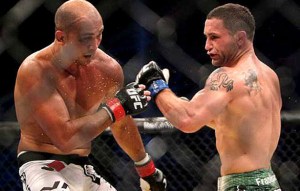Update: Scott Coker has announced that Strikeforce will be independently testing all fighters on tonight’s card because “it’s the only fair thing to do.” Uh-oh.
This Saturday night is the “Strikeforce: Heavy Artillery” show from St. Louis, Missouri, headlined by that other heavyweight champion Alistair Overeem taking on Fedor’s most recent opponent and rising MMA star, Brett Rogers.

Big muscles, anemic reputation - Strikeforce Heavyweight Champion Alistair Overeem (Photo: K-1)
The burning question isn’t whether Overeem’s skills may have faded over the last two and a half years whilst he battled far lesser competition overseas, or if Brett Rogers can use a superior ground game to overcome Overeem’s more technically sound striking. It’s whether or not Overeem is going to fight clean of Performance Enhancing Drugs, and if the Missouri State Athletic Commission is going to test him at all.
Jonathan Snowden over at Bloody Elbow wrote about Missouri’s secretive testing procedures, which seem to indicate it’s likely Overeem won’t be tested at all and, if he is, it won’t be as thorough and accurate a test as one might encounter in one of the more reputable States with an Athletic Commission (eg. Nevada, New Jersey).
Some have taken the media and bloggers to task for crucifying Overeem for what is, to date, unconfirmed speculation of drug use. Overeem himself says that it’s not unheard of for someone to gain ten pounds of muscle mass a year, and he’s also in the past attributed his dramatic increase in size to a diet heavy on horse meat.
Regardless, it creates even more questions of legitimacy in a fledging promotion that has been plagued with them over the course of the last few months.
Overeem, whether he’s using performance enhancing drugs or not, has not faced a real test at heavyweight in his career. All name fighters he’s beaten, a la Mirko Cro Cop, have been long past their prime. He has taken fights for the sake of appearing on the card despite several opportunities to fight in the States. It certainly raises a lot of questions. Not just about whether or not he’s clean, but whether or not he’s confident enough in his own abilities to face a real challenge at heavyweight.
It almost seems as if Strikeforce would have been better off without Fedor Emelianenko. Now they have a costly WAMMA Heavyweight Champion (a title granted by an organization that is for all intents and purposes defunct) whose management brings them back into the room after every fight and a promotional champion who will never be seen as legitimate in the eyes of fans. Even a convincing victory over Brett Rogers and subsequent win over Fedor Emelianenko will not alleviate the speculation about his size increase.
Some will argue that focusing on the lighter weight classes would cause Strikeforce to flounder and lose money without a heavyweight drawing card. Unfortunately, that discounts the fact that Emelianenko has become a bottomless pit of money for which they’ve seen absolutely no financial return and that, unlike Japan, fans in North America won’t pay money to see a fight if they don’t consider one or both of the fighters to be legitimate.
As I’ve written before, Strikeforce’s biggest obstacle to success is the view fans have of it as a disaster waiting to happen. Right now they’re trying to run uphill with a Russian heavyweight managed by crazy goons, a disgraced promotional champion who won’t fight stateside, and a post-fight mugging on network television amongst other mis-steps. As unfair as Dana White’s comments are at times, he’s not pulling these observations out of thin air.
It’s too late to steer the ship in the other direction, since they’ve already set the stage for an Overeem/Fedor fight or rematch with Rogers. But once they’ve hit that landfall, they’d be better off as a promotion if they followed part of the formula for success that brought the UFC to dominance in the sport – focus on the fighting and make the fighters the stars of your promotion, and not the other way around.

